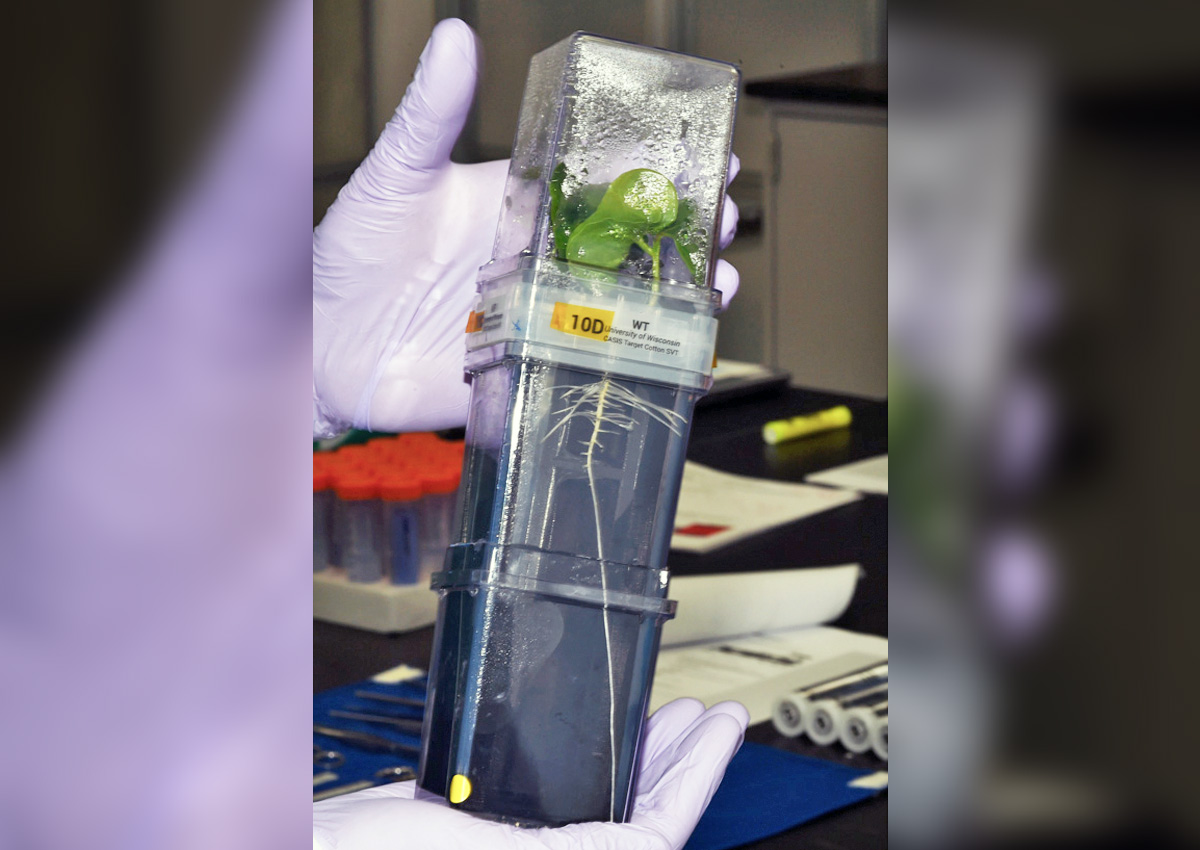
GE Cotton Goes to the International Space Station
June 9, 2021| |
On June 3, 2021, botanist Simon Gilroy from the University of Wisconsin-Madison launched cotton seeds including genetically modified ones to the International Space Station (ISS) on a SpaceX Dragon capsule. Gilroy and his team will study cotton seedlings grown on the ISS to better understand cotton growth. This is the first time that cotton will be grown in space.
Gilroy's team will compare cotton grown in space and on Earth to try to understand how the important crop's root system grows under the unique stresses of zero gravity. The research, funded by Target, is designed to help scientists understand how to more efficiently grow cotton, which requires enormous quantities of water.
For this experiment, two types of cotton will be sent to the ISS. "We're flying regular cotton, but we're also flying cotton that is genetically engineered to produce a protein that, on Earth, makes cotton more resilient to a big spectrum of stresses. That protein on Earth is switched on under low-oxygen environments. Our prediction is that the overexpression line will grow better in space," says Gilroy.
Ahead of the launch, Gilroy's research team will prepare cotton seeds on specialized Petri dishes at the Kennedy Space Center in Cape Canaveral, Florida. The seeds will then be loaded into the Dragon spacecraft and sent to the space station, where astronauts will install them into growth chambers. The seeds are expected to germinate and grow for six days. During this time, astronauts will photograph their roots to capture information about their size, shape, and direction of growth. Back on Earth, the Gilroy lab will perform an identical experiment.
For more details, read the news article in the University of Wisconsin-Madison News, or follow SpaceX Cargo Mission on NASA's website.
| |
You might also like:
- Cotton Research Goes to Space
- Bacterial Strains Isolated in International Space Station Could Help Grow Plants in Mars
- Biotech Crop Annual Update: Cotton
Biotech Updates is a weekly newsletter of ISAAA, a not-for-profit organization. It is distributed for free to over 22,000 subscribers worldwide to inform them about the key developments in biosciences, especially in biotechnology. Your support will help us in our mission to feed the world with knowledge. You can help by donating as little as $10.
-
See more articles:
-
News from Around the World
- ISAAA Webinar: What is Gene Drive?
- World's First Kelp Burger Launched
- Software Tool to Boost Precision Agriculture
- GE Cotton Goes to the International Space Station
- AquaBounty's GE Atlantic Salmon Gets Approval in Brazil
- Pakistan Seeks Cooperation with China to Develop Agricultural Sector, Enhance Food Security
- UWA and ICRISAT Researchers Identify Genes to Improve Chickpea's Phosphorous Uptake and Use Efficiency
- GM Poplars Approved for 4-Year Field Trial in Belgium
-
Plant
- Putting Breaks on Gene Editing with Anti-CRISPRs
- European Animal Farmers, Breeders Laud European Commission's Report on New Genomic Techniques
- Canadian Grain Farmers Back Gene Edited Crops
- International Trade in Crops with New Breeding Technologies: The Australian Perspective
-
Read the latest: - Biotech Updates (February 11, 2026)
- Gene Editing Supplement (January 28, 2026)
- Gene Drive Supplement (February 22, 2023)
-
Subscribe to BU: - Share
- Tweet

